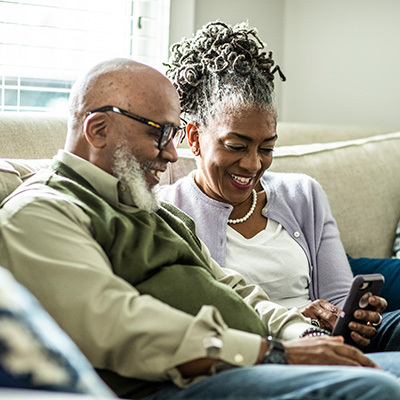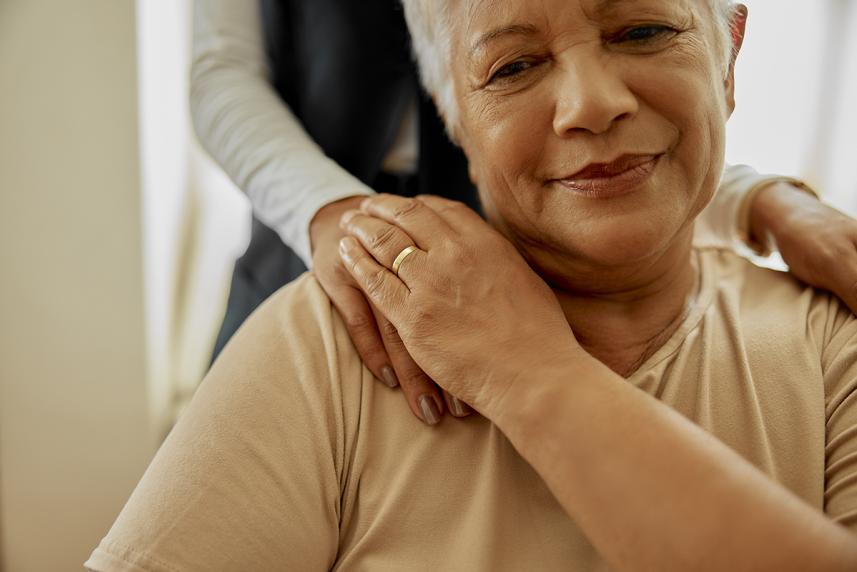
Find out if you qualify for an Aetna® Dual Eligible Special Needs Plan — we’re ready to help.
The last thing you want to do after a hospital stay is go back. We’ve got strategies to help you heal at home.

There is nothing quite like sleeping in your own bed after a hospital stay to make you grateful for good health. But sometimes it can be short lived. About 14 percent of recently discharged patients have to go back to the hospital in any given month.* Among the most common causes are blood infections, heart failure and complications from diabetes.
The good news: You can avoid many of these readmissions, says Karen Curtiss, a board-certified patient advocate and executive director of The Care Partner Project in Chicago. Here’s how to work with your care team and loved ones to increase your odds of a full recovery at home.*

Find out if you qualify for an Aetna® Dual Eligible Special Needs Plan — we’re ready to help.
You should start planning your discharge as soon as you enter the hospital or set the date for a planned admission, says Curtiss. You can make some post-discharge care arrangements in advance.
If possible, you or a loved one should ask to meet with a discharge planner on your first day. That will give you more time to prepare. Some questions you may want to ask include:
On the day of your discharge, try to have at least one family member or friend with you. “There’s so much confusing information being thrown at you. You really want to make sure that you have an extra pair of eyes, ears and hands,” says Curtiss. “Make sure that you understand all the discharge and medication instructions, and that any appointments for follow-up testing or care don’t fall through the cracks.”
Ideally, someone with you should take notes, or record the discussion on a cell phone. Just be sure to ask the medical provider first. “You can explain that you don’t want to bother the doctor later with a phone call in case you miss an important detail,” says Curtiss.
Now that you’re ready to go home, here are some more questions you’ll want to ask the discharge planner:
It’s also very important to have a thorough medication record, which can help guide your drug schedule at home. “Oftentimes, patients are given a medication dose before they leave the hospital. But they may take another dose too soon by mistake because they’re in the habit of taking all their pills in the evening,” says Curtiss. “That can send you right back to the hospital.”
Going through your front door may feel like home sweet home. But there may be some new challenges to face. It can be hard to do some daily living activities on your own, says Curtiss. For instance, bathing or cooking for yourself. “And you may have picked up an infection at the hospital that isn’t apparent until you get home,” says Curtiss.
To ease your transition, it can help to give some tasks to others if possible. Curtiss suggests that you ask family or friends to give you a hand with:
One of the biggest risks when you get home from the hospital is falling, says Curtiss. It’s most likely to happen in your bathroom or kitchen, where floors get wet and slippery. Some ways to help fall-proof your home:
Be aware of warning signs that point to needing your provider’s attention. Curtiss suggests looking out for the following:
If you or your loved one notices any of these signs, reach out to your doctor immediately. They may point to an infection or blood clot. The faster you act, the sooner you can get the medical care you need. And hopefully avoid a repeat hospital stay.
If you qualify for both Medicare and Medicaid, you may be eligible for an Aetna® Dual Eligible Special Needs Plan (D-SNP).
If you're 65 or older and have diabetes or an eligible heart disease, you may qualify for an Aetna® Chronic Condition Special Needs Plan (C-SNP). C-SNPs are currently available in select counties in IL and PA.
You may be eligible for an Institutional Special Needs Plan (I-SNP) if you’ve lived (or plan to live) in a participating facility for 90+ days or you have Medicare Part A (hospital insurance) and Part B (medical insurance).
*FOR 14 PERCENT READMISSION STATISTIC SOURCE: Weiss AJ, Jiang HJ. Healthcare Cost and Utilization Project. Overview of clinical conditions with frequent and costly hospital readmissions by payer, 2018. Statistical Brief #278. Agency for Healthcare Research and Quality. July 2021.
*FOR INCREASE RECOVERY ODDS SOURCE: The Care Partner Project. Plan for discharge: transitioning recovery care from hospital to home.
Aetna Medicare is a HMO, PPO plan with a Medicare contract. Our DSNPs also have contracts with state Medicaid programs. Enrollment in our plans depends on contract renewal.
See Evidence of Coverage for a complete description of plan benefits, exclusions, limitations and conditions of coverage.
Plan features and availability may vary by service area.
Participating health care providers are independent contractors and are neither agents nor employees of Aetna. The availability of any particular provider cannot be guaranteed, and provider network composition is subject to change.
Eligibility for the Model Benefit or Reward and Incentive (RI) Programs under the Value-Based Insurance Design (VBID) Model is not assured and will be determined by Aetna after enrollment, based on relevant criteria (e.g., clinical diagnoses, eligibility criteria, participation in a disease state management program).
For mail-order, you can get prescription drugs shipped to your home through the network mail-order delivery program. Typically, mail-order drugs arrive within 14 days. You can call the phone number on your member ID card if you do not receive your mail-order drugs within this timeframe. Members may have the option to sign-up for automated mail-order delivery.
To send a complaint to Aetna, call the plan or the number on your member ID card. To send a complaint to Medicare, call 1-800-MEDICARE (TTY users should call 1-877-486-2048), 24 hours a day/7 days a week. If your complaint involves a broker or agent, be sure to include the name of the person when filing your grievance.
For accommodation of persons with special needs at meetings, call 1-833-278-3924 (TTY: 711).
The benefits mentioned are part of special supplemental program for the chronically ill. Eligibility is determined by whether you have a chronic condition associated with this benefit. Standards may vary for each benefit. Conditions include Hypertension, Hyperlipidemia, Diabetes, Cardiovascular Disorders, Cancer. Other eligible conditions may apply. Contact us to confirm your eligibility for these benefits.
Nondiscrimination Notice | CA-Specific Non Discrimination Notice
©2025 Aetna Inc.
Y0001_3938451_2025_M
3957033-06-01
Call us at 1-844-514-8290 (TTY: 711) between 8 AM and 8 PM, Monday to Friday. Or visit AetnaMedicare.com/YourDSNP anytime.